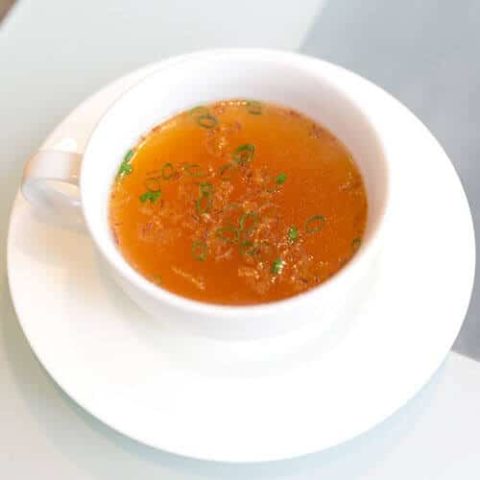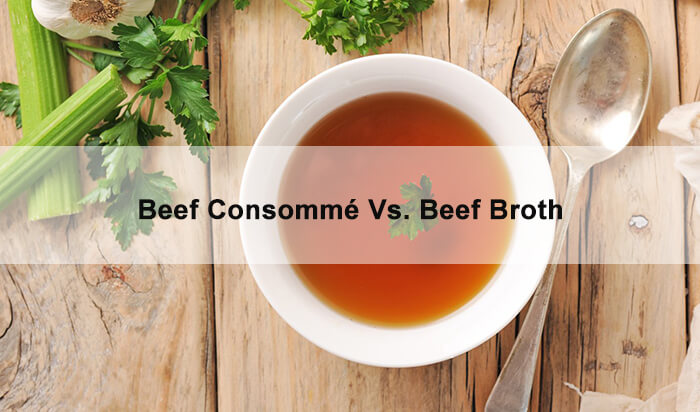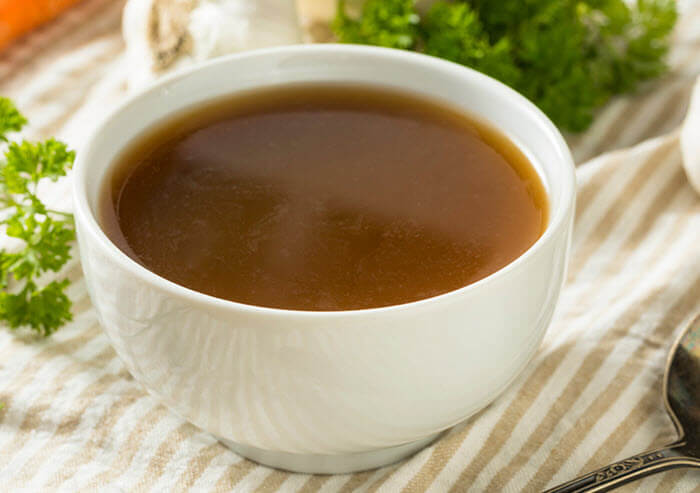Beef consommé is a classier form of beef broth. The use of both savory liquids in foods cannot be removed.
This article will give a complete “180” on beef consommé and beef broth.
Table Of Contents
30-Second Summary
Beef consommé is a clear, flavored soup, while the beef broth is a simple savory liquid made from simmering meat, bones, and vegetables.
A critical difference between beef consommé and beef broth is that beef consommé can be served on its own, while the beef broth is used to flavor other foods. Beef consommé and beef broth can be used interchangeably in a recipe; a few modifications have to be made.
You can buy them at grocery stores or online shops.
What is Beef Consommé?
A beef consommé is a clear, flavored soup made from seasoning and beef stock.
Beef consommé is usually served on its own. It’s a clear, meaty, profoundly flavored, and satisfying soup.
The French word consommé means complete; hence, beef consommé is a whole soup.
A Brief Beef Consommé History
It is believed that consommé originates in Europe. Although, it referred more to cooking techniques, not the dish’s name.
With time consommé was a dish associated with royalty, upper class, and refinement. This was as a result of its ingredients.
Meat- loads of it were a significant ingredient in consommé, and not everyone could afford it, hence the association with wealth and class.
After centuries of ruling the dining tables of the elite in the 1960s, consommé finally disappeared in the ’80s when casual dining replaced formal dining.
Also read: 15 Best Beef Consommé Substitutes + Homemade Recipe for You
What is Beef Broth?
Beef broth is a flavor-filled liquid made from seasoning, bones, meat, herbs, and vegetables (optional). It’s gotten after simmering these ingredients for about one or two hours.
You can add any spice or vegetable to the basics if you want a more flavored, nutritious broth.
Read also: Is Beef Broth Vegetarian?
A Brief Beef Broth History
There is a saying that “a good broth can resurrect the dead .”Those words resulted from its origin and association as a medical staple.
Ancient Greek, Chinese, South American, Egyptian, and Jewish physicians often prescribed broths to patients.
They used broths as remedies for flu, digestion issues, asthma, common cold, etc. Hence, it was light and easy to eat.
Further reading: What Can You Substitute for Beef Broth
Beef Consommé vs. Beef Broth- Differences
These beef soups differ in several ways. Let’s get to it!
Beef Consommé | Beef Broth | |
Origin | Europe | Ancient Greek, Chinese, South American, Egyptian, and Jewish |
Taste | Richer, concentrated | Milder |
Appearance | Clear yet amber appearance | Clear, dark brown in color |
Preparation | Requires a longer preparation time | Requires more ingredients |
Use | Mainly as an appetizer | Mainly serve as an ingredient in other dishes |
Cooking Method | Stewing beef with veggies over gentle heat | Purifying a rich beef broth |
Difference in Taste
Beef consommé has a richer, concentrated, and refined beef flavor. Its robust flavor makes it work as a stand-alone dish.
In contrast, beef broth has a mild, simple beef flavor. It is mainly used to improve the flavor of foods like soups, sauces, soups, or gravy.
Beef broth can be used to improve the flavor of meat and vegetables. Some people drink beef broth.
Difference in Appearance
Beef consommé has a clear yet amber appearance. It has a thicker texture and contains no particles or residues.
Beef broth, however, is thin, clear, and brown. It is grease-free.
You can distinguish a bowl of consommé from the broth by mere looks.
Sometimes beef consommé is referred to as double broth due to its thick texture.
Difference in Preparation
Beef consommé has a longer preparation time. You have to simmer for one or two hours with beef broth.
Additionally, beef consommé requires more ingredients in its preparation. All you need is good old beef and some vegetables and spice to give it flavor with beef broth.
Difference in Use
Beef consommé can be served as a dish, mainly as an appetizer.
On the other hand, beef broth is an ingredient in other dishes.
You can use beef consommé to prepare other dishes, but this requires a certain level of culinary expertise- so you could stick to it as a main dish if you are still in the newbie zone.
These are the critical differences between beef consommé and beef broth, but they also share some apparent similarities.
Similarity Between Beef Consommé Vs. Beef Broth
A plain similarity between these two products is the crucial ingredient- beef.
Both flavored liquids contain beef; you can choose to spice things up by adding other ingredients.
The preparation of beef consommé and beef broth over low heat is similar. Both soups are water-based.
If you would love to prepare this exotic soup- beef consommé, we have “cooked up” a good recipe.

How to Prepare Beef Consommé
Straightforward recipe to enjoy an exotic soup.
Ingredients
- ½ pound of ground sirloin, or shank or shoulder
- ½ pound of ground sirloin, or shank or shoulder
- 3 quartered Roma tomatoes.
- 3 quartered Roma tomatoes.
- 6 cups of cold veal or beef stock
- 6 cups of cold veal or beef stock
- 4 coarsely chopped celery ribs
- 4 coarsely chopped celery ribs
- 4 large egg whites with eggshells
- 4 large egg whites with eggshells
- 1 tablespoon of crushed black peppercorns
- 1 tablespoon of crushed black peppercorns
- 1 sprig of fresh thyme
- 1 sprig of fresh thyme
- 2 teaspoons of salt
- 2 teaspoons of salt
Instructions
1. Whisk the egg whites, eggshells, and peppercorns in a large bowl until the mixture begins to lather. Keep aside.
2. Use a food processor to grind the ground beef, celery, and tomatoes.
3. Boil the egg white mixture, ground beef mixture, stock, thyme, and salt in a large pot. Stir continuously.
4. The solids will form a raft at the top of the pot at some point. Remove a little piece of the raft. Check that all impurities have risen to the top of your pot.
5. Stop stirring, reduce the heat and simmer for about 40minutes. Be mindful not to touch the raft. If you do, your consommé might be cloudy.
6. Once it's cooked, line a fine-sized mesh with double cheesecloth and strain the liquid.
7. After straining, your beef consommé is ready to be served.
Nutrition Information:
Yield: 10 Serving Size: 1Amount Per Serving: Calories: 397Total Fat: 19gSaturated Fat: 7gTrans Fat: 0gUnsaturated Fat: 9gCholesterol: 179mgSodium: 648mgCarbohydrates: 2gFiber: 1gSugar: 1gProtein: 50g
FAQs About Beef Broth Vs. Beef Consommé
Is beef bouillon the same as beef broth?
Yes. Beef bouillon comes in dehydrated form. It could be in a cube or powder.
One cube of beef bouillon dissolved in water would give you one cup of broth.
So, if you don’t have bullion cubes, you can use one cup of broth you have available.
Can you use beef consommé instead of beef broth?
You can substitute them, yet, you need to make some changes.
Since consommé is denser, you will have to dilute it and make it mild and thin. That way, it’s suitable as a broth.
Where to buy beef consommé?
It may not be readily available like beef broth, but you can always check at nearby grocery stores.
You can find canned consommé at supermarkets too. If not, an excellent old Amazon search will get you what you need.
Ensure the can is in good condition and its content has not expired.
Soups and broths are never missing in kitchen action. They are versatile and easy to prepare. Ensure you make great use of their “kitchen glory.”



